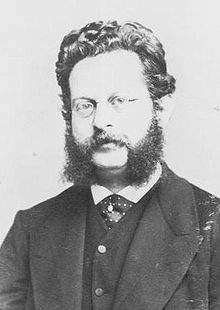Sigismund Kohn-Speyer
Sigismund (Sigmund) Leonhard Kohn-Speyer , also Kohnspeyer (born August 29, 1830 in Frankfurt am Main , † May 20, 1895 in Königstein im Taunus ) was a German merchant and banker of Jewish descent in Frankfurt.
Life
Kohn-Speyer was a wealthy and at the same time charitable Frankfurt merchant, resident at Bleichstrasse 30 at least from 1860 to 1869. He was the son of the Jewish trader Leopold Isaak Kohn-Speyer. On February 8, 1870, Kohn-Speyer was awarded the contract for the “mechanical cotton spinning mill” in Kulmbach at a public auction for only 276,000 guilders . He then founded a new stock company with other investors .
Kohn-Speyer was President of the Frankfurt Theater Committee and from 1868 to 1877 director of the Frankfurt City Theater . He was a member of the Physikalischer Verein , since 1860 the Senckenberg Society for Natural Research and since 1865 the "Society for Trade, Industry and Science" in Frankfurt. He was also a shareholder, board member and sponsor of the zoological garden and a member of the planning committee for the 1891 International Electrotechnical Exhibition . After all, he was also a board member of the Frankfurt Rifle Club. He was also a member of the Frankfurt Freemason Lodge Zur Aufstieg Morgenröthe .
In 1867, Kohn-Speyer was one of the first Frankfurt citizens to buy a summer residence in Königstein im Taunus . In 1869, thanks to his financial support, a building site for a synagogue was bought in Königstein without ever building a house of worship. He is one of the sponsors of the first Kronberg rail link. He was a sponsor and treasurer of the committee for the construction of the Niederwald monument .
In 1871 Kohn-Speyer married the soprano Antonie Labitzky (born November 19, 1833 in Beschau , Bohemia ; † August 1, 1894 in Königstein im Taunus), daughter of the conductor Joseph Labitzky (1802-1881) and Antonie Herget. The opera singer had been an acclaimed audience favorite of the Frankfurt City Theater after two rehearsal guest performances, but withdrew from the stage after the wedding.
He died on May 20, 1895 at the age of 65. Due to his good relations with the German imperial family, Empress Friedrich , who lived in the neighboring Kronberg in Schloss Friedrichshof , was one of the first to give his condolences to his family and also attended his funeral. Like his wife nine months earlier, Kohn-Speyer was buried in the Königstein cemetery.
Honors
- He was the first honorary citizen of the city of Königstein
- Order of the Red Eagle
literature
- Heinz Sturm-Gordramstein: Jews in Königstein - Life, Meaning, Fates , City Archives Königstein (ed.), Königstein im Taunus 1998
- Beate Großmann-Hofmann: Sigismund Kohnspeyer - Königstein's first honorary citizen , in: Königsteiner Woche, Volume 26 (1995), Issue 42, Pages 1–2
Individual evidence
- ↑ Hans-Otto Schembs: From the hall to the town houses , 1989, page 38 ( excerpt )
- ↑ Death report in "The Musical Times" from July 1, 1895
- ^ Address and business manual of Frankfurt am Main , 1868/69 (K) ( [1] )
- ↑ Ulrich Wirz: Around the Plassenburg. Studies on the history of the city of Kulmbach , 2003, page 288 ( excerpt )
- ↑ Jürgen Steen: "A new era ...!". The International Electrotechnical Exhibition 1891 , 1991, page 269 ( excerpt )
- ↑ The Königstein City Archive writes: "In 1867, the banker and trader Sigismund Kohnspeyer bought the villa on Frankfurter Strasse, now Haus Mettenheimer, which Wilhelm Schulz from Krefeld had built ten years earlier in the Swiss style."
- ↑ On the history of the Königstein synagogue
- ^ Esther-Beatrice Christiane von Bruchhausen: The character in the costume ball. Marianne and Germania in political iconography , dissertation (1999) at the Philosophical Faculty of the Martin Luther University Halle-Wittenberg, Frankfurt 2001, page 185 ( footnote 533 )
| personal data | |
|---|---|
| SURNAME | Kohn-Speyer, Sigismund |
| ALTERNATIVE NAMES | Kohnspeyer, Sigismund; Kohn-Speyer, Sigmund |
| BRIEF DESCRIPTION | German merchant and banker |
| DATE OF BIRTH | August 29, 1830 |
| PLACE OF BIRTH | Frankfurt am Main |
| DATE OF DEATH | May 20, 1895 |
| Place of death | Königstein im Taunus |
